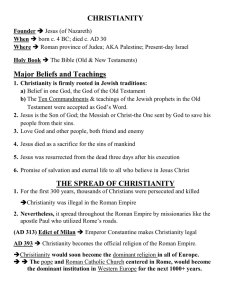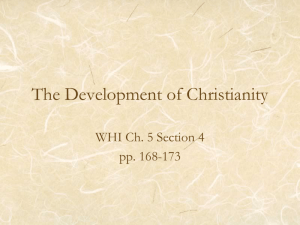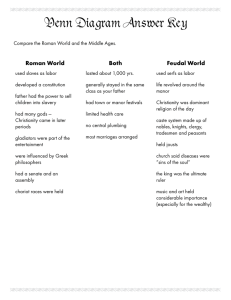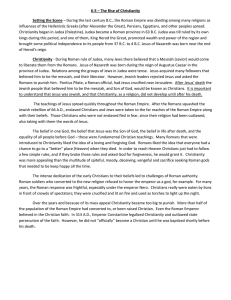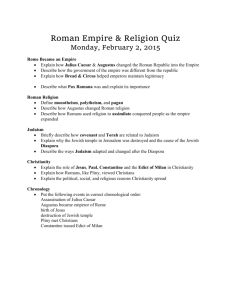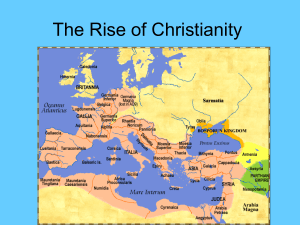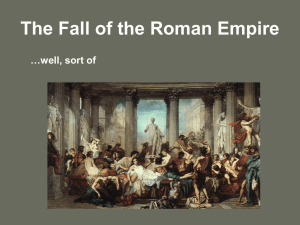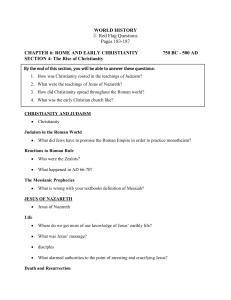The Rise of Religious Empires - Scarsdale Union Free School District
advertisement
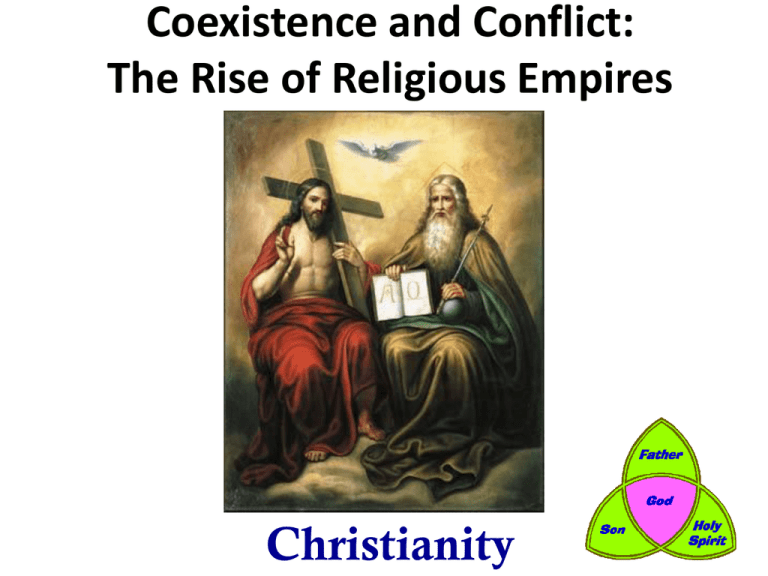
Coexistence and Conflict: The Rise of Religious Empires Christianity OVERVIEW The rise of Christianity marks an important break with the dominant values of the Greek and Roman worlds. The Christian views on God, human beings, and the world were quite different from those of the Greeks and Romans. Roman religion did not provide a moral base or a message of hope. The Romans had an elaborate religious system with many groups and types of deities. Religion was based on ritual, magic and superstition. For those dissatisfied with traditional religious experience, there were various philosophical schools of thought that offered moral foundations for human behavior, but no hope. For those who wanted a more personal relationship with the divine, there were mystery cults that focused on a particular god or goddess. However, in the first half of the first century CE, events unfolded in the Roman province of Judea that would have a massive impact, not only on the Roman Empire, but on Europe as a whole. Roman Religion Official Religion Worship of multiple chief gods Ritual Unofficial Religion Tolerant of local gods/goddesses in provinces Cults and spirits What did this look like in practice? • Success of the empire • Strengthen authority of the emperor cult of the emperor • “unite” the people “We have overcome all the nations of the world, because we have realized that the world is directed and governed by the gods.”- Cicero The emperor Marcus Aurelius & family, offers sacrifice outside the Temple of Jupiter Capitolinus after his victories in Germany. Expansion of the Roman Empire until the death of Augustus Caesar in 8 CE Judea: Roman Province Judea lost its independence in the 1st century BCE when, in 6 CE, it came under direct Roman rule and Herod’s family became the procurators of the province. Even though the people of Judea (“lands of the old Jewish Kingdom of Judah”) were predominately Jewish, there was no Jewish state or even a monolithic religious or cultural entity at this time. Tensions • What tensions might have existed between the Romans and the Jews? • How might people have responded to those tensions? Sadducees Socio-political party Zealots Political group Pharisees scholarly group that interpreted Torah Essenes separate religious community How to deal with the Romans? How to honor traditions/practice faith? cooperation with Romans -Wealthy class - Pious, but didn’t believe in authority of ancient laws -Didn’t believe in resurrection of dead or afterlife extremists who advocated the violent overthrow of Roman rule -rejected Jewish leaders and support of Rome -lower classes -believed in interpretations of the Torah & observance of the laws -believed in the resurrection of dead & afterlife awaited a Messiah who would: -save Israel from oppression -usher in the kingdom of God -establish a true paradise on earth -believed they alone possessed the truth -focused on purity and ritual “silent majority” not political, not revolutionary, not scholarly, just followers of customs Who was Jesus of Nazareth? • Where was he from? • What was life like in that area? • What role did the Temple play in the Jewish community at that time? Adoration of the Shepherds, illustration by Guido Reni, 17th century What was Jesus’ Message? Christianity began as a reform movement within Judaism that evolved into a separate religion based on the teachings of Jesus. “So in everything, do to others as you would have them do to you, for this sums up the law and the Prophets.” [Matthew 7:12] Humility Charity Love Sermon on the Mount, illustration by Carl Heinrich Bloch, 19th c “Do not think that I have come to abolish the law or the prophets; I have not come to abolish them but to fulfill them.” [Matthew 5:17] “Love the Lord your God with all your heart and with all your soul and with all your mind and with all your strength. This is the first commandment. The second is this: Love your neighbor as yourself.” [Mark 12: 30-31] Reactions to Jesus Radicals Conservative Religious Leaders Romans -disappointed that he didn’t proclaim he would save Israel from oppression and establish God’s kingdom on earth -believe he was undermining respect for tradition in Jewish religion -believed he was a potential revolutionary who might lead Jewish people into another revolt against Rome Crucifixion of Jesus of Nazareth, by Marco Palmezzano, ca. 1490 0 100 200 300 378 313 250 70 30 4 The Spread of Jesus’ Message and the Rise of Christianity 400 Beliefs of Early Christians -not a universal, unified, coherent religious movement -churches were diverse and move in very different cultural and language contexts -adopted a lot of concepts from other pagan religions as developed -believed that remarkable development showed “the hand of God working in history” Why did Christianity attract so many followers? Promise of salvation is made possible by Jesus’ death and resurrection “blessed are the meek, for they shall inherit the earth” [Matthew 5:5] suffering will be lifted Personal relationship w/ human figure -easy to relate to -offered immortality No painful or expensive initiation -baptism -“purification by water” -starts personal relationship w/ Jesus “blessed are those who hunger and thirst for righteousness, for they will be filled” [Matthew 5:12] injustice will be rectified The Exhortation to the Apostles by James Tissot Why did Christianity attract so many followers? Fulfilled human need to belong and to form compassionate communities -Assistance to poor, sick, widowed, orphaned -Eventually, Christians will provide “social welfare” to communities within the Roman Empire Attractive to all social classes -rich, poor, aristocrats, slaves, men, women Reform without revolution -spiritual equality for all without violence “And [you] have put on the new self… Here there is no Greek nor Jew… barbarians, Scythian, slave or free, but Christ is all, and is in all.” [Colossian 3:10-11] Christ = “anointed” in Greek, which is a literal translation of the Hebrew word “messiah,” which means “anointed one” What impact did the explosive growth have on the development of Christianity? • Explosive growth meant that not everyone, everywhere was doing the same thing, reading the same scriptures, telling the same stories, signing the same hymns. • Focus of doctrine can be on different things Christ’s crucifixion Christ’s message and wisdom Jewish religious traditions (Matthew) Converting non-Jewish people (Paul) The Emperor’s Conversion – Constantine I Became patron of one particular branch of Christianity WHY? • Moves east after he solidifies control over both west and east many more Christians concentrated in cities in east • Compared himself to David • he saw himself as a righteous king • consolidates his power through religion SO? • Combination of church/state • Edict of Milan IMPACT ON CHRISTIANITY • • • • Brings church and imperial state together Patronizes one church over all others, persecutes other sects Provides power, money and authority to unify beliefs Opens door for Theodosius to make Christianity official religion of Roman Empire in 380 Emperor Constantine I, presenting a model of the city to Virgin Mary. Detail of the southwestern entrance mosaic in Hagia Sophia (Istanbul, Turkey). The Spread of Christianity, 300-600
